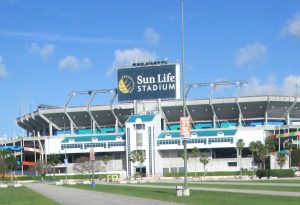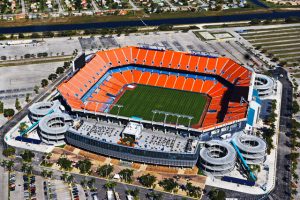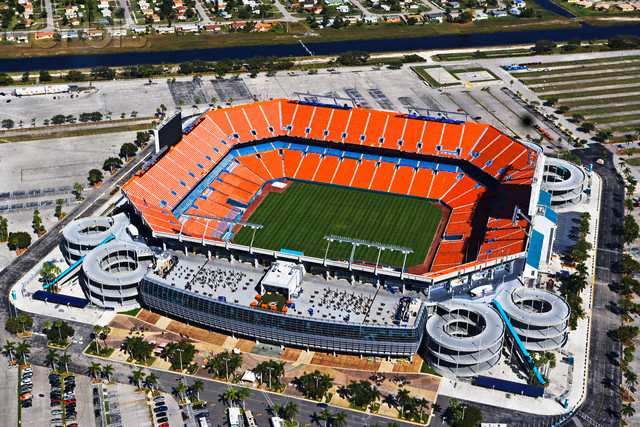We all got a close up and rare look at the contentious battle between Miami Gardens and Miami-Dade County for control of  Sun Life Stadium Tuesday in a joint meeting of both municipal governing bodies over the city’s lawsuit against the county for regulatory oversight.
Sun Life Stadium Tuesday in a joint meeting of both municipal governing bodies over the city’s lawsuit against the county for regulatory oversight.
And it got a little testy.
“How much more time do you need? Til 2017? 2018? We’ve been at this for three years,” said Miami Gardens Councilwoman Lisa Davis, addressing county commissioners who were confused or unsure about transferring control of the stadium within the city’s limits.
“Who ‘didn’t know about it?’,” she asked, using air quotes.
“If we’re going to be called second class citizens,” said Mayor Oliver Gilbert, promising not to drop the lawsuit, “it’s going to be from a bench and a judge not from this dais and certainly not from the stadium.”
Sun Life Stadium has been regulated by the county since before it was even Pro Player Stadium to when we called it Joe Robbie Stadium. All zoning and building approvals, street maintenance and other regulations for all stadium properties, called collectively the  Dolphin Center Development of Regional Impact, fall under the county’s jurisdiction.
Dolphin Center Development of Regional Impact, fall under the county’s jurisdiction.
But when the city of Miami Gardens was incorporated in 2003, there was apparently something written in the charter that gives city leaders the idea that the stadium was to transfer to their control in 2012. They want to oversee any permits for development of the DRI and 27th Avenue corridor — which is seen by some in the city as a prime redevelopment area. The city also may want to oversee permits and staging for events — for which the county will soon start paying up to $5 million a year — that impact the traffic and quality of life for their residents.
The city sued for control in 2014. Tuesday’s meeting was a required step to see if a settlement could be reached before the lawsuit moves forward. Because the county and the Miami Dolphins organization, which owns the stadium, have said that the charter gives the county the decision by a two-thirds vote that, according to both parties, are not there.
“This is a matter of interpretation,” said Richard Weiss, attorney representing the city. “We’re not asking for a change in charter. Elected officials have a right to interpret their own charter.”
the city. “We’re not asking for a change in charter. Elected officials have a right to interpret their own charter.”
Al Dotson, representing the Dolphins, said he thought they were close to an agreement before Tuesday’s meeting.
“We are, quite frankly, surprised that Commissioner [Barbara] Jordan is being put in this position. We thought that as of last week, these issues were being resolved,” Dotson said. “To hear a motion that the city wins the lawsuit gives the city everything. We’ve worked very diligently to reach a settlement.”
Oliver interrupted him with a jab that was clear evidence of a troubled relationship between the team and the city.
“I was  distracted by your hair, your lovely hair,” he told Dotson, and later he lashed out at the county commissioners, saying that this issue “only exists here in the 111 building. Because everywhere else in the state of Florida, elected officers are the ones who interpret their charter.”
distracted by your hair, your lovely hair,” he told Dotson, and later he lashed out at the county commissioners, saying that this issue “only exists here in the 111 building. Because everywhere else in the state of Florida, elected officers are the ones who interpret their charter.”
Commissioner Audrey Edmonson supported Jordan’s motion to give control of the stadium to Miami Gardens. “It’s time the city be made whole,” she said.
Commissioner Xavier Suarez said that even he, who is not only a lawyer but has taught law at the university level, was unsure of what to do. “I am totally confused,” he said. And Commissioner Bruno Barreiro complained that the three page summary he got was insufficient information on which he could make an informed decision.
“I know the commissioner in the area knows the issue and has been involved, but we have not,” Barreiro said. And I think he was looking at Lisa Davis at the time.
In the end, commissioners passed a motion of intent to settle the matter that basically postpones the decision another two weeks or more.
Oliver swore he would take it to the Supreme Court if he has to.
“We’re not going to abate the lawsuit,” he said. “We abated it once before for congeniality. But we are not going to do that again.”

